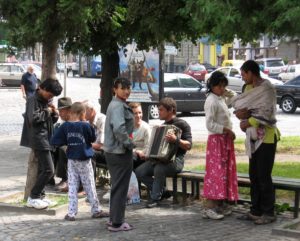International Roma Day Recognizes the Struggle of the Eastern European Minority
Romani people in Lviv, Ukraine.
In various Eastern European nations, April 8 is recognized as International Romani Day to celebrate the unique culture of the Romani people. It is also a day of remembrance; as Deutsche Welle describes, it is a day that " highlights the persecution and discrimination that Roma people face in all areas of life."
The Romani people are the largest ethnic minority in Europe, with the greatest concentration in Eastern European states such as Bulgaria, Hungary, and Slovakia. Evidence from a 2012 genomic study places the origin of the Romani on the Indian subcontinent from which they migrated across the Eurasian continent, settling in Europe around the 14th century.
The Indian heritage of the Romani people was even recognized by India's external affairs minister Sushma Swaraj in February 2016. In a statement inaugurating the Indian Council for Cultural affairs, he said that the Romani are "the children of India who migrated and live in challenging circumstances in foreign lands for centuries."
"We in India are proud of you … welcome you with an open heart," he added.
While granted acceptance by international governments and given verbal support by foreign leaders, the Roma nonetheless face discrimination. Since their migration to countries such as Spain, Hungary, and the United States, the Romani people have been historically faced with the unfortunate experience of persecution and prejudice. In Slovakia, for example, the poor and unemployed have used the Roma as scapegoats for their condition and deflected the blame onto the often misunderstood ethnic minority, as reported by Jacobin magazine.
This Anti-Ziganism, a term used to describe the hostility or prejudice against the Romani people, also exists on the governmental level of certain countries, especially in Eastern Europe. In 2015, the Bulgaria’s Nationalist party encouraged the demolition of Romani settlements that were deemed illegal by local building codes, acting directly against an appeal from the European Court of Human Rights, the BBC reported.
The Romani people still fall victim to hate crimes by racist groups and experience systematic oppression from societies that cannot provide them affordable housing or public services, as evidenced by an illiteracy rate of up to 20 percent that propagates their strife. This systemic anti-Ziganism underscores the importance of days such as International Roma Day, which call to mind the struggles of the oppressed people and the need for broad societal changes in Europe in the future.

